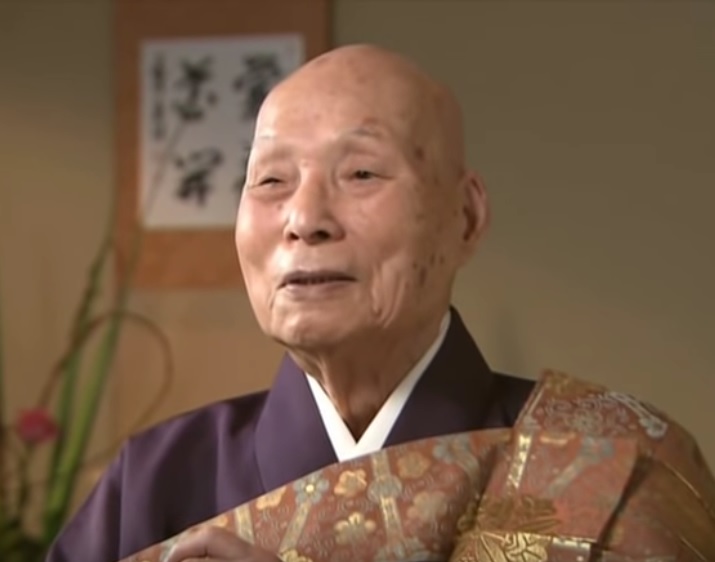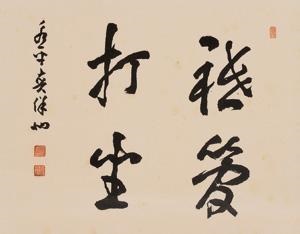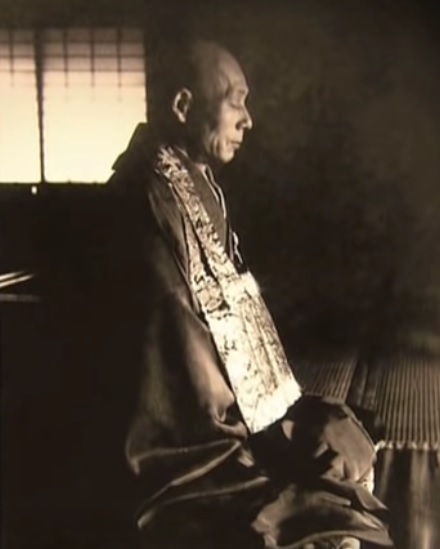ZEN MESTEREK ZEN MASTERS
« Zen főoldal
« vissza a Terebess Online nyitólapjára

宮崎 (栴崖) 奕保 Miyazaki (Sengai) Ekiho (1901-2008)
78th abbot of Eiheiji, at 95 years old

「祇管打坐」 Shikan-taza
Calligraphy by Miyazaki Ekiho
How to Live Here and Now
by Rev. Sensho Watanabe
Sotoshu Specially Dispatched Teacher
Toryuji, Niigata, JapanBerkeley Zen Center • Shogakuji
California, U.S.A. September 20th, 2019.I practiced at Daihonzan Eiheiji from 1981–1984.
This was at the time that Miyazaki Ekiho Roshi,
later to become the 78th Head Abbot of
Eiheiji and who died in 2008 at the age
of 108, who was Director of Eiheiji. He
served in that position as the person with the
most responsibility for looking after the monastery.
It happened that at that time I was assigned
for seven months to be part of the crew who
served as the Director Roshi’s assistants. There
were six of us monks, each of us was in our
second year of training at Eiheiji. Every day, our
work assignment changed.
The assignment that needed the most study
on our parts was that once every six days one of
us had to be his personal attendant (Anjya),
helping Miyazaki Roshi. At Eiheiji, the monks
rise at 3:30 a.m. However, Roshi would come out
of his room between 2:50 and 3:00 a.m. On the
day I was his attendant, I was expected to follow
him like a shadow from the time he left his
room. So, we would get up at 2:30 a.m. and after
using the toilet and washing up, we would wait
outside his door, kneeling. Then, huffing and
puffing with deep breaths, Roshi would come
out of his room. Since this was before the wakeup
bell at 3:30 a.m., the hallways were dark
because the lights were not yet turned on. While
shining a flashlight so he could see where he
was going, we would climb 100 steps and
proceed to the Zendo. No matter how big Eiheiji
is said to be, if you walk for ten minutes you can
reach the Zendo.
In the inner room of the Zendo, the monks
were still sleeping. While lights out is said to be
at 9:00 p.m., and this is rest time, in actual fact,
it often happened that it was after 10:00 p.m.
before the monks went to bed. This was because
we needed time to reflect on the day just
finished as well as to prepare for the next day.
Since the wake-up bell is at 3:30 a.m., the
monks were fast asleep when Roshi and I
reached the Zendo. Without paying any attention
to the sleeping monks, Roshi would remove
his slippers and get up on a half-size tatami mat
in the outer hall near the entrance to the Zendo
and sit in zazen. I would arrange his slippers
and sit at one end of the outer hall.
This was at about 3:10 a.m., which meant
that we sat there in zazen for 80 minutes or twice
as long as the others. By the time the bell to end
zazen was hit, my legs had gone beyond numbness
to the point where I couldn’t feel anything
at all. When it was time to get off the sitting platform
following zazen, I was supposed to be helping
Roshi put on his slippers, but because my
legs were sound asleep, I couldn’t move. Roshi
was quick to get over the numbness in his legs
and put on his own slippers so he would walk on
ahead. Somehow or other, I would get the feeling
back in my legs and feet and run after him.
Catching up with him, I would apologize saying,
“I’m sorry.” But while I thought I was bad, Roshi
was never angry with me.
One early morning during the summer at
4:30 a.m., the morning sun was beginning to
rise, the edge of the mountains was becoming
brighter, and I could hear the chirping of the
birds. Morning zazen was hard, but when it
ended, I had felt happy. “Today, I’ve done good
practice,” I thought. As Roshi and I were walking
along the hallway together, we came to some
stairs that were a little higher. There, as Roshi
climbed, I lifted his butt with both of my hands.
By lifting him up, I knew that he was breathing
a little easier.
It wasn’t only in the morning. On any day,
when Roshi came out of his room, he always
kept to one side of the hallway. And sometimes,
he would do curious things. Walking ahead of
me, he suddenly bent over and, breathing heavily,
he rearranged something on the floor.
What do you think he was doing?
At Eiheiji, each person wears slippers with
own name on them. When you enter a room,
you always neatly arrange your slippers against
the wall. If there are five people in a room, then
there should be five pairs of slippers neatly
arranged in the hallway outside the room. Occasionally,
there was a pair of sandals that were
not neatly arranged. Roshi would then suddenly
bend over and then straighten himself up.
Slowly standing up – he was already more than
80 years old – and smiling like a child, he would
say “Ah! Those sandals have attained Buddhahood.”
During the seven months I served as one
of his attendants, I had that experience several
times. Naturally, the other monks doing this job
also had the same experience. Back at the room
where his assistants on duty gathered, we wondered
to ourselves, “What do you think it
means? It surely means we should treat the slippers
with care.” This is what we imagined as we
spoke together about this.
It wasn’t only slippers that attained Buddhahood.
At Eiheiji, there is a twenty- tatami mat
room called “Shoken no Ma” where visitors are
met. At one end of the room, there is a
tokonoma with a big incense pot. Whenever a
group of visitors came to this room, a large stick
of incense about twelve inches long was lit and
placed in that pot. One day, the stick of incense
I had put in the pot was leaning to one side.
Coming into the room, Roshi immediately
noticed it and said,
“Now, now. A stick of incense should be
placed straight. Put it in once again.”
“Yes,”
I said and with great care and attention, I
reset the stick of incense making sure it was
straight. Once again, with a child-like smile he
said,
“Yes, that’s the way it should be. Now that
stick of incense has attained Buddhahood.”
The stick of incense became a buddha.
One time, Roshi was standing in the hallway
to one side and I came out of the assistants’
room in a hurry quickly closing the paper door
and it made a loud noise as I shut it. Roshi said,
“Hey! Paper doors should be closed slowly.
Do it again.”
“Yes,”
I said. I reopened and closed the door once
again, this time taking great care to do it slowly
and quietly. Wouldn’t you know, there was that
smile again,
“That’s right. That the way to close it. Now,
the door has attained Buddhahood.”
Slippers, incense, the door, there may have
been other things as well that attained Buddhahood.
Those three things are the ones I clearly
remember.
Later, after I had practiced for three years at
Eiheiji, I returned to my home temple in Niigata,
and became the resident priest of that temple. In
1993, Miyazaki Roshi was installed as the 78th
Head Abbot of Eiheiji.
He became the abbot of Eiheiji at the age of
93 and since he was a rare and great Zen maser
who continued his practice centered on zazen
until he died at the age of 108, he attracted the
attention from people in all directions. In 2004,
NHK(Japan Broadcasting Corporation)-TV did a
special program on him called “104 years old
Zenji of Eiheiji.” Since I served directly as his
attendant, my eyes were glued to the television
when this program aired.
At the age of eleven, he had left his parent’s
house and entered a temple. He had smoked
cigarettes when he was young but made great
effort to stop smoking. At the age of 60, he contracted
miliary tuberculosis. One side of his
lungs couldn’t move. This was how I learned the
reason for his heavy breathing when he was
walking. He may have breathed heavily during
zazen as well.
There was a surprising thing he said during
this TV special.
“I am Miyazaki Ekiho. I am Eiheiji.”
I thought, “Hmmm. ‘I am Eiheiji.’ The 78th
Head Abbot of Eiheiji said this…” Eiheiji had
been founded by Dogen Zenji in 1244. After
that, many monks who cherished Dogen Zenji
came from around Japan to train there. But
wasn’t it too much to say, “I am Eiheiji”, no
matter who you are?” This is what I thought to
myself.
After saying this, he continued by saying,
“Eiheiji and I are one. There is nothing as important
as oneself, but that important self lives
together with many monks in a building
designed as a monastery. We live together with
trees, mountains, rivers, and all sorts of animals.
We live together in a natural environment. Since
people as well as the environment are the self, to
take care of Eiheiji is to take of oneself.”
I felt a little bit of relief when even Miyazaki
Zenji said that the most important thing is oneself.
And then, when you look closely at that
important self, you understand how it is that we
are able to live by means of many people, things,
and the environment. He was saying that it isn’t
possible to not take of all the things around us.
When I heard those words, the meaning of
Zenji’s words when I was training at Eiheiji
about the slippers, incense, and the door attaining
Buddhahood made sense. Since he was one
with the monks, when a monk’s slippers were
not lined up, it was the same as having his own
slippers out of line. So, he had no choice but to
straighten them up. He had to treat the slippers
with care and that was the same as for the
incense and for the door. Truly, he had removed
the walls between himself and other by holding
onto that 1.5 personal pronoun relationship.
This was precisely by coexisting with other
people and in so doing he taught me there is
happiness in living that way. The bottomless
smile on Zenji’s face spoke of that happiness.
Finally, as a specific practice, I would like to
introduce a poem titled “Lining Up Footwear.”Lining Up Footwear
Aligning footwear, the mind is also aligned.
Aligning the mind, footwear is also aligned.
If you align your footwear when you remove them,
Your mind will not be disordered when you put them back on.
If someone leaves their footwear out of order,
Align them without saying anything.
If you do it like this,
Then surely the minds of the world’s people will be aligned.What do you think?
When you enter a Japanese toilet, you of
course line up your slippers neatly. But if someone
else’s slippers are disordered, it is important
to also straighten them up. But when you do
this, don’t take the easy way and line them up
with your feet. Stretch out your arms and use
your hands. Treat the slippers with care. It is
important to think about the next person who
will use those slippers and straighten them out.
In each moment of our everyday lives to realize
that we live together with those people,
things, and environment that surrounds us is
what connects us with each other’s happiness.
![]()

Un maitre du soto zen - 1902-2008 - 95 ans de zazen
https://www.youtube.com/watch?v=aC2ncga_4Hg